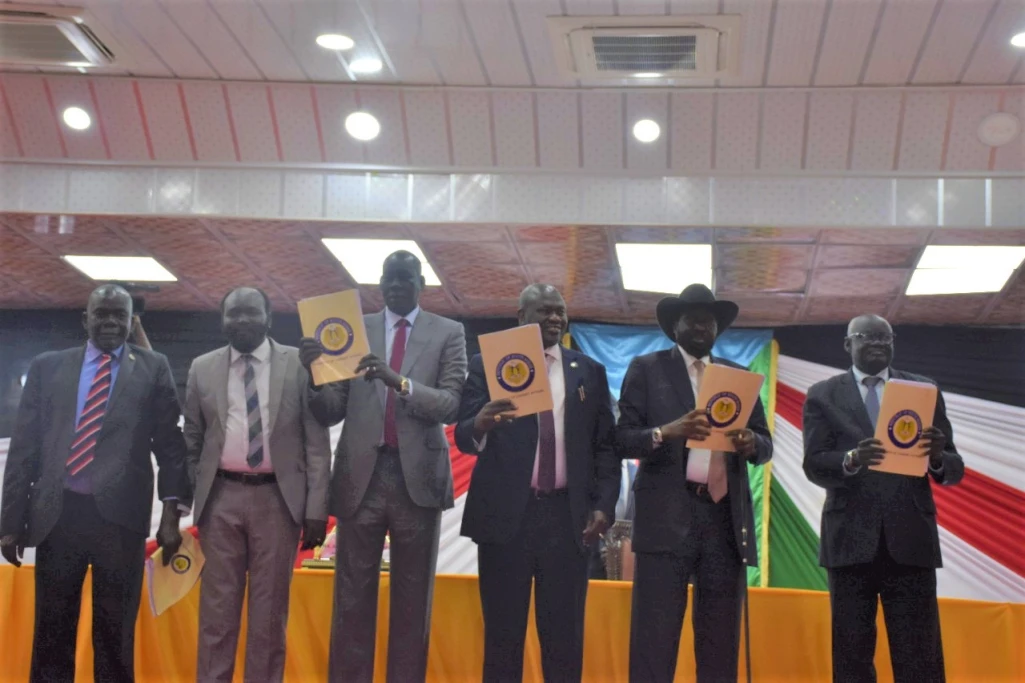
South Sudan Transitional Government of National Unity has extended the transitional period for another 2 years.
The extension roadmap was signed by 5 parties to the revitalized agreement in Juba on Thursday.
They say the extension is to ensure the parties complete the implementation of the remaining provisions in the agreement.
The previous transitional period was expected to an end in the next six months although most of the provisions in the peace deal have not been implemented.
“Today (Thursday), I am informing the people of South Sudan that the political parties who signed the revitalized agreement to resolve the conflict have unanimously agreed to a 24months extension of the interim period,” President Salva Kiir declared at Freedom hall in the function attended by senior leadership of the parties to the peace deal.
The slow pace of the implementation of the 2018 peace deal has been attributed to a lack of political will and funding by the unity government. Its partial implementation has largely been attributed to the lack of political will from the leaders.
Crucial reforms unrealized in the 2018 peace deal include institutional reforms, enactment of permanent constitution, graduation of unified forces, funding of reparation and reconciliation bodies, among others.
In his remarks, President Kiir assured the public that the remaining period will be used to realize the agreement in full.
“We will redouble our reforms to complete this (extended period) to lead you to a successful election and build an effective government.”
For his part, the First Vice President, Dr. Riek Machar said prominent among the priority issues that need to be addressed in the new timeframe are security arrangements and the constitution making process.
“In percentage; 27.3% of the provisions are implemented, 31.3% of the agreement are in progress, 41.4% is pending and not touched. So it mean you have 72.7 of the agreement not implemented. You have no choice but to extend,” he said.
In July, the United States announced it has pulled out support for peace peace monitoring bodies; RJMEC and CTSAMVM – accusing the leaders of lacking seriousness about the peace implementation.
Some international partners of South Sudan have also been sceptical of what the leaders will do in another extended transitional period. Others such as the United Nations Mission in South Sudan called for a clear roadmap to democratic elections.
“I want to say the extension is genuinely for this peace agreement to be implemented because the people of South Sudan have a right to elect their leaders,” Dr. Machar, who is also the leader of the SPLM-IO stated.
Edmund Yakani, a representative of the civil society urged the parties to recommit themselves to the provisions of the 2018 agreement so as to avoid future extensions.
“Previously, we heard statements that this peace agreement is imposed, now this roadmap is our own making without anybody we term as a foreigner. Can we demonstrate political will that you are going to implement this peace agreement and it means stopping our citizens from killing themselves and improving our economy?” he asked.
On Tuesday, the United Kingdom Special Envoy for Sudan and South Sudan said “any actions that are taken from now – be it extension or a roadmap, we must see immediate actions which help the people and…to show that…people are serious in terms of the implementation.”
Robert Fairweather said the parties must facilitate a process that will lead to elections and ensure there is a civic space for people to have political debate.
The British Ambassador to South Sudan, Jonny Baxter asserted that the current “peace agreement remains the only path to peace, prosperity, accountability, transparency and stability in South Sudan.”
On July 7, President Salva Kiir – during a mass presided by the Vatican Secretary of State, His Eminence Cardinal Pietro Parolin – pledged to steer South Sudan towards permanent peace and stability despite obstacles he said are contributing to the slow-paced implementation.